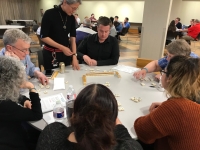Peer Knowledge Sharing for Better Adult Programs
Dallas Public Library, Texas
Innovation Synopsis
In 2017, the Dallas Public Library dramatically restructured its adult services working model. Working groups focused on target audiences, subject areas and goals identified from DPL’s Strategic Direction. Audience and subject teams work together to create targeted and replicable programming. Through greater staff engagement, programming is more innovative and thoughtful.
Challenge/Opportunity
DPL faced drastic budget cuts and personnel lay-offs during the recession. These shortages cut many programs for adults and as the library has recovered its staffing levels adult services staff rebuilt programming within their own units. While youth services has a coherent theme around literacy for programs, adult services span a wider array of needs and interests. Thus, adult programming staff often worked in silos of their own units with little shared expertise or understanding.
Key Elements of Innovation
Working groups focused on five targets: parents, older adults, new Americans, financially empowering and millennials. Subject focuses included: science and nature, health and wellness, civic engagement, digital literacy and arts and culture. Special teams focus on building capacity and coordination across the system on core programs. Target audience and subject areas groups work together for one quarter to plan programming and then rotate to new combinations in following quarters allowing staff to visit multiple locations.
Achieved Outcomes
Staff report increased enthusiasm, learning and relationships since its launch in October 2017. We see improvements in job satisfaction and staff retention among and have seen improved staff attendance, up 25 percent, at centralized monthly meetings. The experience sharing with colleagues who work in neighborhoods unlike their service area has helped staff rethink how they plan programs and measure success and has improved their critical thinking on how a program fits into the community.

